Filter 1300 resources:
- social media (440)
- facebook (337)
- disinformation (252)
- news (188)
- media (179)
- algorithm (111)
- filter bubble (100)
- twitter (96)
- blogging (81)
- psychology (79)
- community (79)
- medium (75)
- trust (68)
- curation (63)
- ai (56)
- bloggingportal (55)
- us2020 (55)
- comments (54)
- trump (53)
- identity (50)
- blog (47)
- content strategy (46)
- promotion (46)
- troll (45)
- politics (43)
- publicsphere (43)
- linkedin (41)
- polarization (39)
- factchecking (39)
- eu (35)
- fediverse (34)
- journalism (34)
- tool (33)
- privacy (32)
- science (28)
- conspiracy (26)
- regulation (25)
- democracy (25)
- content marketing (25)
- covid19 (25)
- us (24)
- ocm (24)
- productivity (23)
- censorship (23)
- instant articles (22)
- newsletter (22)
- google (22)
- storytelling (21)
- snapchat (20)
- cognitive (19)
- advertising (18)
- bot (18)
- metrics (18)
- communications (18)
- moderation (17)
- groupthink (17)
- instagram (17)
- bluesky (17)
- populism (17)
- video (17)
- atprotocol (17)
- multilingualism (16)
- engagement (16)
- science communication (16)
- cambridge analytica (16)
- authenticity (16)
- open web (16)
- social marketing (15)
- semantic (15)
- propaganda (15)
- web20 (15)
- delegitimise (15)
- innovation (15)
- brexit (14)
- ai4communities (14)
- myhub (14)
- google+ (14)
- addiction (13)
- mastodon (13)
- design (13)
- viral (12)
- post-truth (12)
- platform (12)
- enewsletter (12)
- outreach (11)
- decentralised (11)
- strategy (11)
- hate (11)
- ethics (11)
- surveillance (11)
- marketing (11)
- qanon (11)
- audiovisual (10)
- bloggingportal2 (10)
- attentionweb (10)
- mobile (10)
- tribe (10)
- echo chamber (10)
- backfire effect (10)
- realtime (10)
- bxlsbbl (9)
- deletefacebook (9)
- native advertising (9)
- content (9)
- hoax (9)
- science journalism (9)
- domestic (9)
- russia (9)
- guide (8)
- augmented reality (8)
- crowdsourcing (8)
- creativity (8)
- minimalist (8)
- blogpocalypse (8)
- media literacy (8)
- usa (8)
- longform (8)
- narcissism (7)
- machine learning (7)
- knowledge management (7)
- fblabrats (7)
- psychometrics (7)
- ello (7)
- business model (7)
- influence (7)
- twitter migration (7)
- free speech (7)
- persuasion (7)
- transparency (7)
- vote (7)
- bullshit (6)
- participation (6)
- blogger (6)
- b2b4me (6)
- llm (6)
- brand (6)
- seo (6)
- open source (6)
- gdpr (6)
- visual (6)
- signaltonoise (6)
- activitypub (6)
- policy (6)
- image (6)
- truth (6)
- nlp (6)
- climate (6)
- ux (6)
- collective intelligence (6)
- clickbait (6)
- audience research (6)
- suppress (6)
- framework (6)
- deep fake (5)
- podcast (5)
- gtd (5)
- society (5)
- partisan (5)
- humour (5)
- outrage (5)
- confirmation bias (5)
- sceptic (5)
- europe (5)
- cory doctorow (5)
- search (5)
- antitrust (5)
- gender (5)
- stream (5)
- campaign (5)
- pr (5)
- chatgpt (5)
- antivaxxer (5)
- happiness (5)
- moments (5)
- startup (5)
- personal (5)
- yanss (5)
- chat (4)
- ec (4)
- bias (4)
- editorial (4)
- app (4)
- eurosceptics (4)
- zettelkasten (4)
- youtube (4)
- publishing (4)
- data (4)
- 2ndbrain (4)
- culture (4)
- author (4)
- bbc (4)
- reddit (4)
- employee engagement (4)
- amp (4)
- election (4)
- threads (4)
- crm (4)
- fbpaper (4)
- blm (4)
- interactive (4)
- organisation (4)
- blogactiv (4)
- brussels bubble (4)
- event (4)
- cookies (4)
- top3pods (4)
- learning (4)
- facebook live (4)
- apple (4)
- evidence-based policy (4)
- substack (4)
- inoculation (4)
- debunk (4)
- massive.wiki (3)
- wikipedia (3)
- publication (3)
- api (3)
- australia (3)
- europa (3)
- internal communications (3)
- narratives (3)
- big data (3)
- fail (3)
- mobocracy (3)
- pay4content (3)
- screencast (3)
- paper (3)
- motivated (3)
- rebelmouse (3)
- letters2eu (3)
- local (3)
- (3)
- indieweb (3)
- interoperability (3)
- buzzfeed (3)
- machine translation (3)
- live (3)
- machine text (3)
- network theory (3)
- english (3)
- uk (3)
- dissonance (3)
- gpt-x (3)
- livestream (3)
- solid (3)
- ea (3)
- scuttlebutt (3)
- share (3)
- trending (3)
- cozyweb (3)
- signal2noise (3)
- blockchain (3)
- analytics (3)
- elon musk (3)
- dni (3)
- headline (3)
- jeff jarvis (3)
- joan westenberg (3)
- infopocalypse (3)
- idpi (3)
- atprotocol lexicon (3)
- infowar (3)
- meaning (3)
- training (3)
- meme (3)
- sentiment analysis (3)
- rss (3)
- nytimes (3)
- paywall (2)
- eurosceptic (2)
- eparticipation (2)
- memex (2)
- copyright (2)
- euractiv (2)
- comment (2)
- tiktok (2)
- web3 (2)
- hoaxy (2)
- open science (2)
- planetary (2)
- gamification (2)
- knowledge graph (2)
- crisis (2)
- adversarial interoperability (2)
- newsfeed (2)
- flicc (2)
- history (2)
- pink slime (2)
- bundle (2)
- persona (2)
- network (2)
- lobbying (2)
- cms (2)
- ideation (2)
- fascism (2)
- pluralistic ignorance (2)
- collaboration (2)
- filter (2)
- automation (2)
- listicle (2)
- data journalism (2)
- online architecture (2)
- monopoly (2)
- government (2)
- posse (2)
- youth (2)
- ft (2)
- micro.blog (2)
- klout (2)
- enshittification (2)
- sublime (2)
- mindfulness (2)
- fear (2)
- prezi (2)
- farcaster (2)
- counter speech (2)
- credibility (2)
- data visualisation (2)
- tumblr (2)
- iot (2)
- china (2)
- robert putnam (2)
- supergirl (2)
- mojo (2)
- web2.0 (2)
- eurocrap (2)
- wiki (2)
- vine (2)
- newsroom (2)
- model collapse (2)
- radio (2)
- inscrutable (2)
- ruben verborgh (2)
- unfinished (2)
- digital natives (2)
- faceted search (2)
- future (2)
- publicsector (2)
- ahoy2025 (2)
- values (2)
- civil rights (2)
- aggrefilter (2)
- ep (2)
- postmodern (2)
- hr (2)
- livefyre (2)
- expert (2)
- computational propaganda (2)
- evolution (2)
- management (2)
- renee diresta (2)
- theme (2)
- obama (2)
- writing (2)
- antiviral (2)
- misinform (2)
- seenthis (2)
- europcom (2)
- twitterenvy (2)
- optimisation (2)
- futurism (2)
- buffer (2)
- guru (2)
- ipr (2)
- bandwagon (2)
- interface (2)
- expertise (2)
- roi (2)
- amazon (2)
- discourse (2)
- blogtour (2)
- tv (2)
- how to (2)
- conversation (2)
- metaverse (2)
- web design (2)
- tools (2)
- themes (2)
- education (2)
- network effect (2)
- euroblog (2)
- authoritarianism (2)
- information (2)
- fomo (2)
- euractiv-com (2)
- competition (2)
- arg (2)
- sovereignty (1)
- morality (1)
- k4p (1)
- digital transformation (1)
- infographic (1)
- visualisation (1)
- project management (1)
- virtual reality (1)
- framing (1)
- powerpoint (1)
- cmv (1)
- reality (1)
- consultation (1)
- meditation (1)
- liberalism (1)
- ngo (1)
- business (1)
- garden (1)
- willpower (1)
- journal (1)
- seamful (1)
- leadership (1)
- nudge (1)
- behaviour (1)
- memory (1)
- polbot (1)
- metaphor (1)
- fakebox (1)
- knowledge panel (1)
- wikitribune (1)
- define (1)
- mvp (1)
- opinion (1)
- purpose (1)
- design thinking (1)
- software (1)
- spambot (1)
- crowdfunding (1)
- demographics (1)
- geopolitics (1)
- power (1)
- eaststratcom (1)
- egovernment (1)
- meeting (1)
- honesty (1)
- email (1)
- omission (1)
- reflectivity (1)
- dunning-kruger (1)
- kek (1)
- overton window (1)
- airbnb (1)
- tourism (1)
- perception (1)
- cards (1)
- quora (1)
- 360video (1)
- cor (1)
- religion (1)
- schema.org (1)
- ibm (1)
- open data (1)
- law (1)
- biology (1)
- milo (1)
- tutorial (1)
- meritocracy (1)
- edelman (1)
- immigration (1)
- slow news (1)
- storyful (1)
- european (1)
- negativity bias (1)
- philosophy (1)
- microsoft (1)
- homophily (1)
- truth psychology (1)
- “illusory (1)
- transmedia (1)
- coda (1)
- sponsored content (1)
- italy (1)
- disruption (1)
- social capital (1)
- scandinavia (1)
- career (1)
- facial blindness (1)
- capgras (1)
- health (1)
- emotion (1)
- altright (1)
- library (1)
- rationality (1)
- referrals (1)
- spectacles (1)
- glass (1)
- impact (1)
- telegram (1)
- rantic (1)
- dark pattern (1)
- ambassador (1)
- technocracy (1)
- democrats (1)
- mixed reality (1)
- atlantic (1)
- lobby (1)
- intranet (1)
- datamining (1)
- upday (1)
- samsung (1)
- adblock (1)
- sidewire (1)
- syndication (1)
- centralised (1)
- slideshare (1)
- epsc (1)
- text (1)
- bestof2015 (1)
- monetisation (1)
- plagiarism (1)
- fiction (1)
- partnership (1)
- internet (1)
- tag (1)
- pitch (1)
- spain (1)
- essena (1)
- support (1)
- polls (1)
- guidelines (1)
- hootsuite (1)
- fuego (1)
- nuzzle (1)
- river4 (1)
- indignation (1)
- slidecast (1)
- story (1)
- web (1)
- ssi (1)
- economics (1)
- networking (1)
- wellness (1)
- nasa (1)
- diverse (1)
- millennials (1)
- game theory (1)
- technology (1)
- traffic (1)
- apathy (1)
- responsive (1)
- photography (1)
- scraping (1)
- hive (1)
- trove (1)
- planning (1)
- hbr (1)
- trends (1)
- social login (1)
- liveblogging (1)
- lgbt (1)
- boredom (1)
- corporate journalism (1)
- shieldlaw (1)
- shortform (1)
- icebucketchallenge (1)
- isismediablackout (1)
- twitter cards (1)
- survey (1)
- paid (1)
- content partnership (1)
- buzz (1)
- portal (1)
- timeline (1)
- anonymity (1)
- taxonomy (1)
- length (1)
- cpms (1)
- rdf (1)
- linked data (1)
- smo (1)
- tabloid (1)
- upworthy (1)
- python (1)
- right (1)
- seeding (1)
- expiration (1)
- governance (1)
- tackk (1)
- white papers (1)
- kickstarter (1)
- game (1)
- native (1)
- twxplorer (1)
- timing (1)
- newsana (1)
- newscred (1)
- muckread (1)
- pinterest (1)
- social fiction (1)
- profile (1)
- mtf (1)
- information architecture (1)
- vandenbrande (1)
- cultural exchange (1)
- mybot (1)
- vlog (1)
- osmo (1)
- learn (1)
- ugc (1)
- debatehub (1)
- ep2014 (1)
- stanbol (1)
- apache (1)
- rebut (1)
- meps (1)
- scale (1)
- pilot (1)
- eesc (1)
- conform (1)
- blogosphere (1)
- disgustology (1)
- data void (1)
- ebook (1)
- eu09vs19 (1)
- adolescence (1)
- annotate (1)
- selfish (1)
- dissemination (1)
- digital civility (1)
- hosted (1)
- geofence (1)
- sociology (1)
- blackpr (1)
- cofoe (1)
- yeats (1)
- newsguard (1)
- sapiens (1)
- threadapalooza (1)
- gatsby (1)
- roamresearch (1)
- data portability (1)
- philippines (1)
- geoengineer (1)
- euvsdisinfo (1)
- nz (1)
- syllabus (1)
- research (1)
- ussr (1)
- imposter syndrome (1)
- understanding (1)
- goodwill (1)
- cancel culture (1)
- unreality (1)
- deep canvassing (1)
- circuit-breaker (1)
- cui bono (1)
- peace data (1)
- information laundering (1)
- plandemic (1)
- ginsburg (1)
- section230 (1)
- participatory culture (1)
- splinternet (1)
- fleeting (1)
- parler (1)
- diaspora (1)
- filecoin (1)
- gab (1)
- blocklist (1)
- trust net (1)
- sensemaking (1)
- clubhouse (1)
- spaced repetition (1)
- deplatform (1)
- ghost (1)
- mental health (1)
- myanmar (1)
- anonymous (1)
- crosspost (1)
- floc (1)
- standards (1)
- w3c (1)
- crowdtangle (1)
- plato (1)
- label (1)
- flipboard (1)
- fedwiki (1)
- presidency (1)
- andy matuschak (1)
- dunbar (1)
- eu-treaty-institutions (1)
- eu-priorities-and-opinion (1)
- semanticweb (1)
- social-media (1)
- publicsectorinformation (1)
- lisp (1)
- yellow-card (1)
- eurosplinternet (1)
- specialised (1)
- hungarian (1)
- accreditation (1)
- khub (1)
- nft (1)
- wallet (1)
- cooperatives (1)
- multisig (1)
- pkm (1)
- procrastination (1)
- 3p framework (1)
- pkgbook (1)
- fotl (1)
- pattern language (1)
- intimacy (1)
- small is beautiful (1)
- digital garden (1)
- dark forest web (1)
- binggpt (1)
- version control (1)
- agent (1)
- quit (1)
- douglas rushkoff (1)
- znlive (1)
- nostr (1)
- meaning alignment institute (1)
- gpt-4o (1)
- channel (1)
- patchwork (1)
- anuj ahooja (1)
- new public (1)
- pluriverse (1)
- vsop (1)
- pubhub (1)
- public affairs (1)
- will storr (1)
- richard dawkins (1)
- dopamine (1)
- arena (1)
- o1 (1)
- consent (1)
- whitewind (1)
- insurrection (1)
- blacksky (1)
- ahoy (1)
- save social (1)
- leaflet (1)
- eurosky (1)
- altmetric (1)
- anisota (1)
- renée diresta (1)
- open letter (1)
- age verification (1)
- laurens hof (1)
- middleware (1)
- atconnect (1)
- eurostack (1)
Relevant Overviews
- Communication Strategy
- Content Strategy
- Online Strategy
- Online Community Management
- Social Media Strategy
- Content Creation & Marketing
- Online Architecture
- Digital Transformation
- Thinking tools
- Personal Productivity
- Innovation Strategy
- Communications Tactics
- Psychology
- Social Web
- Media
- Politics
- Communications Strategy
- Science&Technology
- Business
Overview: Social Web
Relevant resources
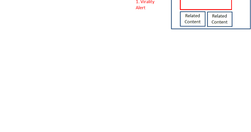
Fake News is suddenly on the boil in the Brussels Bubble. Here are some ideas I brainstormed earlier this week. Comments welcome.

Wales wants to bring the power of the Wiki community and the wisdom of crowds to bear on the media business by creating a hybrid model... local community members can help direct the work of WikiTribune journalists when such events occur, suggesting avenues to explore and co-creating a more permanent news resource that will serve a longer-term comm…
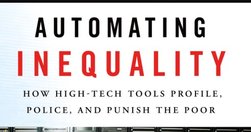
algorithmic systems don’t simply cost money to implement. They cost money to maintain. They cost money to audit. They cost money to evolve ... divert taxpayer money from direct services, to lining the pockets of for-profit entities under the illusion of helping people....a diversion of liability ... those in powerful positions blame the algorithms…
discovering a filtering algorithm's existence in a curated feed influences user experience, but it remains unclear how users reason about the operation of these algorithms.... Interviews revealed 10 "folk theories' of automated curation... Users who were given a probe into the algorithm's operation via an interface ... visible hints disclosing asp…

it is more important than ever to define what “fake news” actually is, and what it is not... BBC Media Editor Amol Rajan has identified three sorts ... Huffington Post blogger ... five sorts... First Draft and ... Shorenstein Center... seven sorts... @DFRLab... fake news is “deliberately presenting false information as news.”... disinformation...…
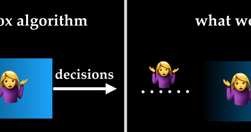
Over the coming years, we’ll see the BBC develop and roll-out more and more machine learning algorithms for storing, retrieving, tagging and possibly even creating content.... What if we lock our audiences in to what they just want to hear, never challenging them? ... Should the algorithms we use be open to public scrutiny?... inform our own thin…

In 2018, we will prioritize News from publications that the community rates as trustworthy... that people find informative... relevant to people’s local community... We surveyed ... people using Facebook across the US to gauge their familiarity with, and trust in, various different sources ...

“If your job consists of Tweeting for someone else, you owe it to yourself to think of something else in 2018. Particularly if you’re under 35."It’s early January, and so time to add to the slew of “What you should do in 2018” posts sloshing around the Net.
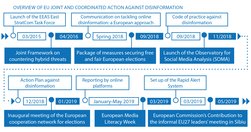
The European Commission is discussing with platforms, news media, research and civil society organisations in order to design solutions to address the spread of fake news. The aim is to define the actors' responsibilities, while respecting the freedom of expression, media pluralism, and the right of citizens to diverse and reliable information.
Reuters designed a social monitoring tool, the Reuters News Tracer, which can identify events that are breaking on Twitter, analyzing millions of tweets with almost 80 percent accuracy.
The answer is different from person to person, and influenced by any number of muddy variables.... real News Feed samples from, 402 people ... half [news-related posts] were shared by someone other than the original publisher... Most of the obviously partisan stuff appeared not in news posts, but in the statuses of friends and family... journalis…
a report published with the Council of Europe... offers better categorizations for the tangle of bad information ... more specific than “fake news” ... [for] The U.S. midterms ... build out a hub ... monitoring disinformation, connecting with newsrooms around the country... we can start scaling it globally in 2019... The benefit of having centrali…

When it comes to how Europeans identify themselves, there are actually six different “political tribes,”... the current polarized debate of “pro-EU” versus “anti-EU” fails to capture the complexity ... 36 percent were the “hesitant Europeans”... proud to belong to the EU but also concerned about issues like immigration.... “contented Europeans.…

The short-term, dopamine-driven feedback loops that we have created are destroying how society works....exploit[s] a vulnerability in human psychology” by creating a “social-validation feedback loop”... you don’t realize it, but you are being programmed
Even in a world where people increasingly get news from social media, the professional news media is still seen as largely to blame for low trust... Reuters Institute for the Study of Journalism examines the underlying reasons for trust and distrust ...Bias, spin and hidden agendas come across as the main reasons...perceived decline in journalisti…

The second meeting Madeleina Kay had was with Luca Jahier. It went longer, and the wifi cut out midway this time - see the 2nd part of this lovely chat.

Could hybrid crowdfunding allow public Institutions to support citizen-driven projects without killing them in the cradle?- 2nd post in reaction to Luc van den Brande’s Reaching out to EU Citizens: A New Opportunity
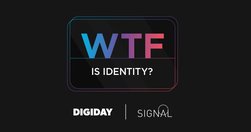
Every day the web is becoming more personal... ... brands ... need to understand more than theoretical profiles or carefully honed audience segments.... master the fundamentals of identity... In this report you’ll learn: - What it takes to create a persistent individualized identity that crosses platforms and screens - How brands and agencie…

to protect U.S. power ... more of the same: more surveillance, more propaganda (“strategic manipulation of perceptions”) and more military expansionism.... The “hyper-connectivity and weaponization of information, disinformation, and disaffection”... the uncontrolled spread of information... the “inevitable elimination of secrecy and operational …
Mom did a very brave thing, considering where and when she lived... She watched a TV documentary about transgender identity... She let it change her thinking. .. turned to me during a commercial break and said, “I think maybe sometimes God makes mistakes.”... never spoke an unkind word about gay, lesbian, or transgender people after that day. For …

“We wanted democracy... but got mobocracy.”... Bots generated one out of every five political messages posted on Twitter in America’s presidential campaign last year... “we need to reform our attention economy.”... groups which had mostly been excluded from the mainstream media... developed the dark arts they would use to further their agendas..…

“fake news”... is grossly inadequate to explain the nature and scale of the problem... is being used by politicians... against the fourth estate and an excuse to censor free speech... There are four distinct motivations ... political, financial, psychological (for personal satisfaction) and social (to reinforce our belonging to communities or “tr…

There are 17 people on the task force, including diplomats, journalists and computer experts, and it has a mandate to combat misinformation coming out of Russia. One of its tools is a website called EUvsDisinfo.eu, which hosts a database with a selection of the most common lies disseminated by Russian outlets
News Quality Scoring Project ... humans and algorithm to separate “commodity news” from “value-added news” ... based on quantifiable and qualitative signals — like word count, freshness versus evergreen material, quote density, contextualization, and the presence of a byline... human/machine, subjective/objective hybrid as the still-under-constru…

I have an obvious incentive to get claps: pretty decent money. ... I can write more polarized headlines... on polarizing topics. I can piggy back on the hot news of the day... write things I don’t actually believe using incendiary language ... Medium has safeguards ... a team of curators ... a policy against abuse that it actually enforces... a t…
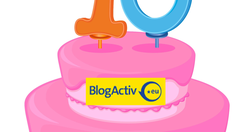
Saying goodbye to my oldblog on my old platform’s 10th birthday.
This edition focuses on getting the most out of podcasts and so includes a new tweak to my personal content strategy.

I was particularly ashamed of the way that the AAA ratings, which were in some sense a mathematical promise of safety, had been actually just lies, mathematical lies... like a weaponized mathematics ... actually people don’t want to know what their actual risk ... mathematics ... was being used ... so that people could go on doing essentially corr…
In the realm of knowledge, monopoly and conformism are inseparable perils. The danger is that these firms will inadvertently use their dominance to squash diversity of opinion and taste. Concentration is followed by homogenization... news media ... have rushed to produce articles that will flourish on those platforms... a duplication of the news…

a major new Yale University study finds that fact-checking and then tagging inaccurate news stories on social media doesn’t work... “disputed” tags made participants just 3.7 percentage points more likely to correctly judge headlines as false... Trump supporters and adults under 26... could actually end up increasing the likelihood that users wil…
Loading more...
Relevant Overviews
- Communication Strategy
- Content Strategy
- Online Strategy
- Online Community Management
- Social Media Strategy
- Content Creation & Marketing
- Online Architecture
- Digital Transformation
- Thinking tools
- Personal Productivity
- Innovation Strategy
- Communications Tactics
- Psychology
- Social Web
- Media
- Politics
- Communications Strategy
- Science&Technology
- Business